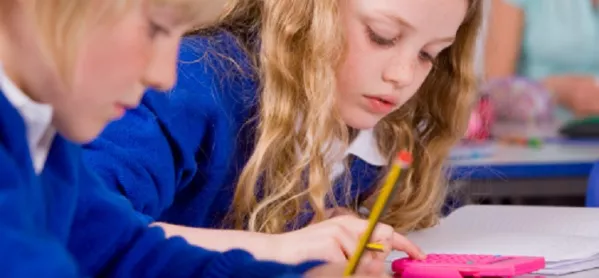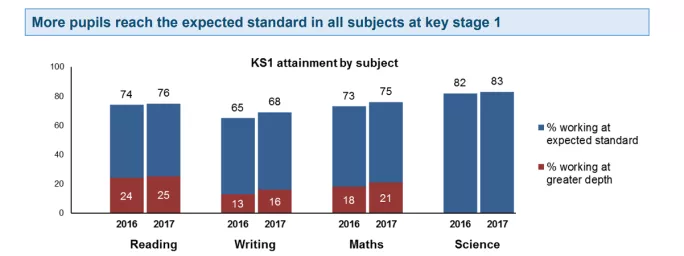More pupils have reached the expected standard in reading, writing and maths this year, but almost one in four did not reach the expected standard in reading.
The proportion of six and seven-year-olds reaching the expected standard in reading has risen to 76 per cent from 74 per cent last year and in maths, 75 per cent of pupils reached the expected standard compared to 73 per cent last year.
The lowest pass rate was in writing where 68 per cent of six- and seven-year-olds reached the expected standard in writing up from 65 per cent last year, according to the key stage 1 Sats results published today.
Source: DfE
The results of the phonics check, taken at the end of Year 1 and Year 2, were also published today. This year, 81 per cent of pupils reached the expected standard at the end of Year 1, the same as last year. But the pass rate by the end of Year 2 climbed to 92 per cent, compared to 91 per cent last year. The phonics check consists of asking children to read aloud 40 words, including 20 non-words.
Source: DfE
Around 640,000 pupils take tests at the end of Year 2 in reading and maths, but the results are not reported. Instead, they feed into teacher assessments of children’s reading and maths. It is these teacher assessments which are reported. Writing is entirely teacher assessed. There is also an optional spelling, punctuation and grammar test.
The government has said that it is preparing to scrap the KS1 Sats from 2023, if its plans for a “teacher-mediated” baseline in the reception year are successful.
It aims to introduce the reception baseline check in 2020, which would mean the KS1 tests would become non-statutory from 2023, although schools would still be expected to assess children and report results to parents.
Commenting on today’s statistics, school standards minister Nick Gibb said: “We want every child to reach their potential and this means ensuring all pupils can read fluently by the time they leave primary school.
“Thanks to the hard work of teachers across the country, and this government’s continued focus on raising standards and increased emphasis on phonics, 6 year olds are reading better than ever before. Today’s results show there are now an additional 155,000 six-year-olds on track to becoming fluent readers. This is a huge achievement, improving the lives and education of hundreds of thousands of children.
“But there is more to do for the youngest children which is why, as we said in our manifesto, we will strengthen the teaching of literacy and numeracy in the early years. We are determined that all children, whatever their background, should have the rich vocabulary needed to fulfil their potential at school.”






